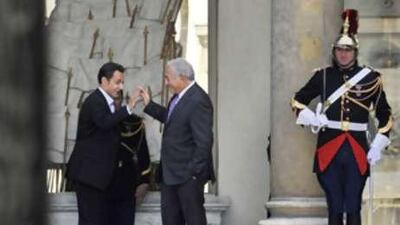While Americans finally reached an agreement on how best to deal with the global financial crisis on Friday, major European leaders met in Paris yesterday amid signs of growing tension between EU member states. The talks, hosted by the French president Nicolas Sarkozy, come amid signs that the financial crisis that devastated Wall Street is spilling over into other sectors of the economy and amplifying a slowdown across Europe.
France and Britain are already in recession, while the pound had its worst week against the dollar since 1992. The euro also fell against the greenback. European governments had to step in and bail out several major banks last week, including Britain's Bradford & Bingley, Belgian-Dutch Fortis, Belgium's Dexia and Germany's Hypo Real Estate. In addition, both Ireland and Greece's governments were forced to guarantee bank deposits, a measure deemed necessary to stop a run on their countries' banks.
Dominique Strauss-Kahn, the head of the International Monetary Fund, met Mr Sarkozy before the meeting and said that the global financial crisis was a "trial by fire". He described the crisis as an unprecedented test for the euro and said that European leaders had to act together rather than thinking of their own national interests. But European bankers hoping for a rescue package similar to that passed on Friday for Wall Street are likely to be disappointed. "We now have the same people who wanted to emasculate public powers being the first to turn to them for an urgent response," Jean-Claude Juncker, the Luxembourg prime minister who chairs the group of Euro zone finance ministers, was quoted saying in La Croix, a French magazine. "I have for the banking profession exactly the same amount of esteem as bankers have for my job - that is, close to zero."
Mr Juncker, the European Commission president José Manuel Barroso and the European Central Bank president Jean-Claude Trichet all attended the meeting. Germany's economy minister, Michael Glos, warned "very well-paid" bankers that they must put their own houses in order and not hope for a government rescue. Bankers will be heartened by the news from Switzerland's UBS, one of the banks hardest hit by the subprime crisis, that it expected to be back in profit in the third quarter.
If bankers should not be hopeful of a bailout, European car markers are already queuing up with their hands out. Fiat's chief executive, Sergio Marchionne, wants the commission to lend them ?40 billion (Dh203bn) to develop environmentally friendly vehicles. This follows the insertion of a clause in the bailout bill passed by the US Congress on Friday that will provide up to US$25bn to American car makers such as GM, Ford and Chrysler. "We've seen that the US industry is now getting $25bn (Dh91.83) worth of support in terms of financing," said Mr Marchionne. "It would be absolutely necessary that the European Commission do exactly the same thing. It was $25bn for the US; in our case it's ?40bn because we have twice the capacity."
Britain's prime minister, Gordon Brown, is unlikely to be sympathetic to this request, partly because Britain has only a meagre car industry left. He told reporters that he would propose a ?12bn fund to help small businesses deal with the international financial crisis "so that small businesses in our country and the rest of Europe can get money immediately so that they can continue to employ staff and continue to provide services".
Behind the smiles and the bonhomie, on only one issue could all the European leaders agree: that there would be no US-style bank-rescue package. * With agencies @Email:rwright@thenational.ae

